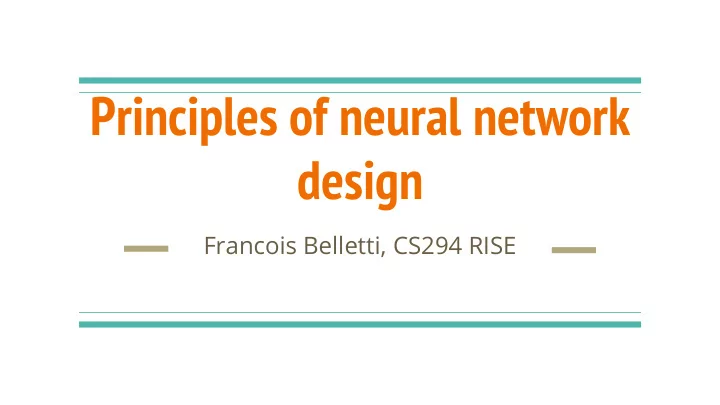

Principles of neural network design Francois Belletti, CS294 RISE
Human brains as metaphors of statistical models Biological analogies Machine learning instantiations The visual cortex of mammals Deep convolutional neural networks Multiple sensing channels Multimodal neural networks Memory and attention LSTMs and GRUs
Neural Networks For Computer Vision
Neural Networks in Computer Vision Neural networks for classification of handwritten digits
Learning Mechanism: Correction of Mistakes Nature used a single tool to get to today’s success: mistake
Modularity Is Back-Prop’s Perk for Software Eng. Back-propagation is a recursive algorithm
Image Classification
Successful Architecture In Computer Vision An example of a wide network: AlexNet
Understanding What Happens Within A Deep NN Examining convolution filter banks Examining activations
Determining A Neuron’s Speciality Images that triggered the highest activations of a neuron:
Another Successful Architecture For CV “We need to go deeper”, Inception:
State of the Art
Recurrent Architectures
Learning To Leverage Context Memory in Recurrent Architectures: LSTM (Long Short Term Memory Network) Input x, output y, context c (memory) y y y Memorization Output Forget gate gate gate c c c y y y Concatenation x x x t
Other recurrent architectures Gated recurrent units:
Why Is Context Important? In language, most grammars are not context free End-to-end translation, Alex Graves
Context Is Also Important In Control Remembering what just happened is important for decision making
Memory is necessary for localization Latest experiment in asynchronous deep RL: LSTMS for maze running Memory comes at a cost: a lot of RAM or VRAM is necessary
Conclusion: the distributed brain
Interaction is crucial in enabling AI
Playing versus computers before beating humans
Bootstrapping by interaction Why would two androids casually chat one with another?
The distributed brain at the edge Distributed RL is reminiscent of the philosophical omega point of knowledge
Multiple Input Neural Networks
Multi Inputs For Inference Youtube Video Auto-encoding
Softmax Multiple Input Control Fully connected layer Multiplexing Inputs Fully connected layer Concatenated output Relu Relu Relu Fully Max Max Max connected Conv Conv Conv layer Relu Relu Relu Fully Max Max Max connected Conv Conv Conv layer Front Rear Radar Odometry Camera Camera
Multiplexing In The Human Brain
Recommend
More recommend